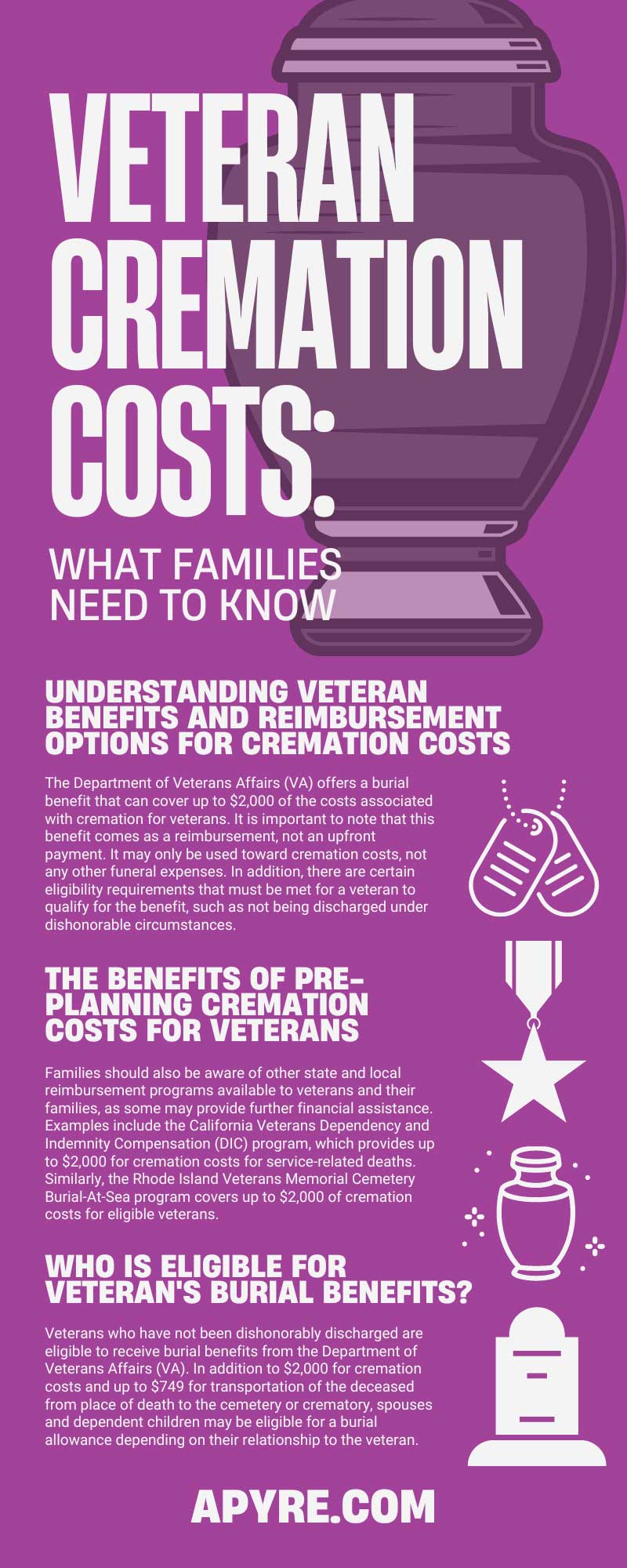Veteran Cremation Costs: What Families Need To Know

When a beloved family member who is a veteran passes away, the last thing families want to think about is money. However, it’s important to understand the costs and options associated with cremation for veterans so that your family can make informed decisions during an emotional time. This is why it’s helpful for families to know about veteran cremation costs in relation to the benefits available through the Department of Veterans Affairs. Here’s an overview of veteran cremation costs and what families need to know about what to consider when making their arrangements.
Understanding Veteran Benefits and Reimbursement Options for Cremation Costs
The Department of Veterans Affairs (VA) offers a burial benefit that can cover up to $2,000 of the costs associated with cremation for veterans. It is important to note that this benefit comes as a reimbursement, not an upfront payment. It may only be used toward cremation costs, not any other funeral expenses. In addition, there are certain eligibility requirements that must be met for a veteran to qualify for the benefit, such as not being discharged under dishonorable circumstances.
The VA also provides reimbursement for additional costs, including up to $749, which can be put toward transportation of the deceased from the place of death to the cemetery or crematory. Families should keep in mind that this is an entitlement program, and funds must be requested within two years of the veteran's death.
The VA also provides a headstone or marker at no charge for veterans who are buried in national cemeteries, and they will cover the cost of opening and closing the grave. It is also important to note that while the VA will cover most of the costs associated with cremation, families may still need to pay out-of-pocket for additional expenses, such as an urn or cemetery plot, unless the interment is in a national veteran’s cemetery. Families should speak with a funeral director or financial advisor in order to understand the full scope of their options and costs before making final arrangements.
Burial in a National Cemetery
For veterans and their families who prefer to find a permanent resting place rather than scattering ashes, there are national veterans cemeteries located throughout the United States that provide free burial plots. These cemeteries may also have space for the interment of cremation urns. These plots may also be used by family members of the veteran if they also served in the military or meet eligibility requirements.
The Benefits of Pre-Planning Cremation Costs for Veterans
Families may find that pre-planning cremation costs can be beneficial in several ways. Pre-planning allows families to discuss their preferences and make arrangements ahead of time, ensuring that their wishes are carried out correctly. These discussions also eliminate the burden on families to make decisions during an already difficult time and help them save money by locking in current costs.
Families should also be aware of other state and local reimbursement programs available to veterans and their families, as some may provide further financial assistance. Examples include the California Veterans Dependency and Indemnity Compensation (DIC) program, which provides up to $2,000 for cremation costs for service-related deaths. Similarly, the Rhode Island Veterans Memorial Cemetery Burial-At-Sea program covers up to $2,000 of cremation costs for eligible veterans.
Who Is Eligible for Veteran's Burial Benefits?
Veterans who have not been dishonorably discharged are eligible to receive burial benefits from the Department of Veterans Affairs (VA). In addition to $2,000 for cremation costs and up to $749 for transportation of the deceased from place of death to the cemetery or crematory, spouses and dependent children may be eligible for a burial allowance depending on their relationship to the veteran.
The families of service members who die while on active duty receive benefits that account for the recovery, evacuation, transportation, and identification of their loved one’s remains and the delivery of their personal effects. Active-duty service members are the only veterans who receive free casketing and transportation of their remains and family members to the burial site.
Other Benefits Available to Cover Veteran Cremation Costs
In addition to reimbursement, there are other benefits available for veterans and their families. These benefits include a burial flag, marker, headstone, or memorial medallion from the VA, as well as military honors at the funeral service.
Applying for Veteran's Burial Benefits
Applying for burial benefits from the Department of Veterans Affairs is a simple process. Eligible veterans and their families are encouraged to contact their local VA representative to learn about available resources and benefit reimbursement options and discuss any documents that may be required to ensure eligibility, such as form 21P-530.
Information needed to apply for veteran's burial benefits may include:
- A copy of the veteran’s DD Form 214 (discharge papers) or equivalent documentation
- The deceased’s Social Security number
- Proof of relationship to the veteran (applicable for spouses and dependents)
- Proof of death (such as a death certificate)
- Proof of income
- A copy of the veteran’s service record
- A copy of a marriage certificate (applicable for spouses)
- A copy of birth certificates (applicable for dependents)
- Documentation to support any additional financial requests (such as additional funeral or memorial expenses)
- A copy of the burial plot deed or statement from cemetery
Once the necessary paperwork is submitted and approved, families can begin to work with a reputable cremation service provider or funeral home to arrange the burial services. An experienced professional will present all available options, including low-cost direct cremation, and will provide the chance to save money by locking in today’s costs. It’s practical and important to consider lower-cost options, especially when families must bear up-front costs and benefits only come as reimbursements after the fact.
It is wise to take the time to research each option thoroughly before making a decision. By doing so, veterans and their families can be sure that the veteran is given a dignified and fitting memorial service.
Applying for burial benefits is a relatively straightforward process that can help families cover the costs associated with a veteran’s cremation or burial services. It’s possible to provide a dignified and respectful sendoff without spending more than the family can afford. Eligible veterans and their families should contact their local VA representative to learn more about what they should know about veteran cremation costs.




